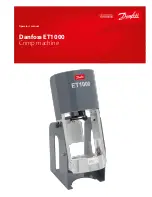
Phone (828)323-8914
Fax
(828)323-8410
Web
101 33
rd
Street Drive SE · Hickory, NC 28602
Safety Procedures
Follow all basic and necessary procedures to secure the electrical site before beginning work.
Follow all existing codes, requirements and instructions for all equipment used in conjunction
with the Jack Jumper™ Cutout Bypass Tool. Inspect the cutout carefully for damaged or
corroded arcing horns, arcing bars or fuse doors. If arcing horns are corroded use standard
electrical procedures to clean the arcing horns prior to utilizing the Jack Jumper™ Cutout
Bypass Tool.
Inspect the porcelain for any damage or cracks. If either condition is found, do not use the
Jack Jumper™ Cutout Bypass Tool.
Trouble Shooting
If the Jack Jumper™ Cutout Bypass Tool appears to be malfunctioning do not attempt to
repair it. Immediately remove it from service, tag it as defective, note the specific problem,
and return it to Utility Solutions for inspection. Any disassembly will invalidate any and all
product guarantees, claims and warranties.
Maintenance
The Jack Jumper™ Cutout Bypass Tool is designed to withstand usual operational usage.
Proper care and handling will increase the longevity of service. Periodically inspect the Jack
Jumper™ Cutout Bypass Tool for corrosion and copper coil fraying/separation. The Jack
Jumper™ Cutout Bypass Tool is sold as a complete unit. Any maintenance, disassembly or
misuse voids any and all warranties, guarantees, or liability.
Warranty
Utility Solutions warrants the Jack Jumper™ Cutout Bypass Tool for any defects in
manufacturing for the period of one year. If the tool is returned within that time period, Utility
Solutions will replace the tool free of charge. No warranty is made if spring is overextended.
Installation
1. Grasp the top perpendicular ring of the Jack Jumper™
Cutout Bypass Tool with the shotgun stick.
2. Extend the shotgun stick as needed and per its instruction.
3. Attach the upper attachment hook so it will not interfere
with fuse removal. Placement:
38kV Models Only - attaches on an arcing horn
between the fuse door and the insulator. This can be
done on either side of the cutout (Figure A)
15kv SMD-20 Power Fuse Models Only - attaches to
the upper fuse door (Figure B).
4. Release the top ring.
5. Grasp the bottom in-line ring of the Jack Jumper™ Cutout
Bypass Tool with the shotgun stick.
6. Gently pull to expand the spring and hook the bottom
attachment hook on the lower fuse door hinge casting
(Figure C). The Jack Jumper™ Cutout Bypass Tool is now
in place; release it from the shotgun stick.
For 200 Ampere SMD-20 systems attach two Jack
Jumper™ Cutout Bypass Tools on opposite sides of
the SMD-20 Power Fuse (
SMD-20 Power Fuse models
only! Other models CANNOT accomodate 2 Jack
Jumpers™
).
7. Be sure the Jack Jumper™ Cutout Bypass Tool is secure
and open the fuse door and replace as necessary.
Removal and Storage
After all repairs are complete and removed
fuses or other items of equipment are
replaced and the fuse door is closed, it is
safe to remove the Jack Jumper™ Cutout
Bypass Tool.
1. Grasp the bottom in-line ring of the Jack
Jumper™ Cutout Bypass Tool with the
shotgun stick and release the lower
attachment hook (Figure C).
2. Release the bottom ring from the
shotgun stick, and then grasp the top perpendicular ring with the shotgun stick.
3. Gently lift the Jack Jumper™ Cutout Bypass Tool until the top attachment hook is free
(Figure A or B).
4. Return the Jack Jumper™ Cutout Bypass Tool to its specially designed storage and
transfer case.
The Jack Jumper™ Cutout Bypass Tool should be stretched slightly and visually inspected
prior to utilization to ensure that the copper coil is not frayed or separated. If fraying or
separation of the copper coil has occurred do not utilize the tool.
Inspection
Upper Attachment Point
SMD-20 Models
Figure B
WARNING
!
!
Do not attach the USJJ-005 Jack Jumper™ Cutout Bypass
Tool to the Arcing Horns on an SMD-20 unit, this is
different from a standard porcelain cutout.
Top Attachment Point
38kV Models
Figure A
Lower Attachment Point
SMD-20 Models
Lower Attachment Point
38kV Models
Figure C




















